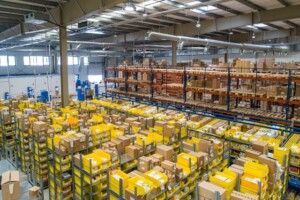How To Build A Warehouse That Lasts

The warehouse industry is growing rapidly, and more businesses move services online. The nature of physical capital is changing and moving away from city centers to regional distribution hubs close to highways.
Because of this, an increasing
number of businesses
are having to plan warehouse construction directly. It is becoming a mission-critical aspect of their enterprise, vital for distributing goods to their global markets.
Building a sustainable warehouse, though, is challenging. Not all companies get it right.
Fortunately, this post is here to help. Here, we run through some of the things you’ll need to consider when building a warehouse to stand the test of time. This way, you can reduce your impact on the environment.
B uild The Warehouse To Be Moisture-Resistant
Warehouse moisture management works a little differently from regular buildings. Many buildings with steel construction can become condensation magnets, particularly when the outside temperature differs from the inside temperature. Moisture is a problem because it can lead to rot, food spoilage, and issues with product quality control. Because of this, all warehouses should invest in moisture-resistance technology.
Make Sure That Your Warehouse Is Termite Resistant
Termites can cause irreparable damage to warehouses, forcing you to rebuild them from scratch. That’s why it is so important to build them from the best materials, such as Butler building parts . Ideally, you want the outer shell of your warehouse to be impenetrable to pests. Concrete, steel, and aluminum should form the outer layer of the building, protecting more delicate and sensitive materials inside.
Make Your Warehouse More Energy Efficient
In addition, you’ll want to construct your warehouse to be more energy efficient. This way, it won’t cost you a fortune to maintain over the long run. For instance, use continuous insulation technology on the walls, floors, and roofs. Invest in LED lights. And if you can, increase the thermal mass of your building to store more energy when temperatures fall.
But it’s also worth thinking about heating solutions that don’t require long-term investment right away. For example, a commercial heating system rental can be a smart option if you need a powerful but temporary heating setup during colder months or during construction. But of course, it’s best if there’s extremely cold temperatures. Besides, you from overcommitting before you know your long-term needs.
Prioritize Indoor Air Quality
You can’t do much to improve exterior air quality, but you can improve the indoor air quality of your warehouse. There are two tools you should use to achieve this: dehumidifiers and air filters. Your warehouse’s HVAC should provide both. But if it doesn’t, you can install separate systems according to your needs. Particle filtration is critical for worker health and ensures that poor air quality does not damage goods. Dehumidification is important for preventing mold growth and keeping your facilities as hygienic as possible.
Make Your Warehouse Flood Resistant
Ideally, you should build your warehouse on elevated land. But if that’s not an option for you, focus on ways to make it more flood resistant, particularly if you are in an at-risk zone. Ultimately, your building should have the ability to drain water in two directions. Your walls and flooring should also have enough strength to maintain their shape and original dimensions after a flood. Warehouses should also be able to limit the spread of fire with smoke barriers and fire partitions. Physical fire protection should be a priority. Warehouses should not collapse after a fire.


